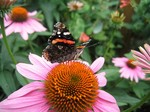Satellites & Butterflies: Climate Change and Species Conservation in North America
Jeremy Kerr
Tuesday, 19 Nov 2013 at 8:00 pm – Great Hall, Memorial Union
Biologist Jeremy Kerr studies how biodiversity is changing as a consequence of climate change. His University of Ottawa lab recently launched the eButterfly Project, allowing researchers and scientists across North America to monitor the numbers and migratory paths of butterflies, which are often viewed as indicators of environmental change. Jeremy Kerr's research program has had practical applications for continental-scale species- and habitat-conservation efforts. It has also been used to predict how changing environmental conditions affect the abundance of disease-carrying species and the prevalence of vector-borne illnesses like malaria. He teaches lecture and field courses in aspects of ecology in Ottawa and Tanzania. The Annual Paul L. Errington Memorial LectureClick here to visit eButterfly.
Kerr has helped organize and develop science consensus statements on requirements for effective endangered species legislation in Ontario and the need for boreal wilderness conservation. Such policy efforts have been accompanied by substantial media communications in Canada and the US. He was awarded an Early Researcher Award in 2007 and the Young Researcher of the Year award at University of Ottawa in 2010.
Kerr completed his B.Sc. in Biology at the University of Ottawa, completing a thesis testing different human causes of extinction risk around the world. He went on to graduate work at York University, where he won the Governor General's Gold Medal. He accepted a postdoctoral position with Professor Lord Robert May in Zoology at Oxford, also working with Sir Richard Southwood. He joined the Canada Centre for Remote Sensing in September 2000 and moved to the University of Ottawa in 2002.
Cosponsored By:
- Agronomy
- College of Agriculture and Life Sciences
- College of Design
- College of Liberal Arts & Sciences
- Ecology & Evolutionary Biology Program
- Ecology, Evolution, and Organismal Biology
- Fisheries and Wildlife Biology Club
- Iowa Cooperative Wildlife Studies Unit
- NREM Graduate Student Organization
- Natural Resource Ecology & Management
- Committee on Lectures (funded by Student Government)
Stay for the entire event, including the brief question-and-answer session that follows the formal presentation. Most events run 75 minutes.
Sign-ins are after the event concludes. For lectures in the Memorial Union, go to the information desk in the Main Lounge. In other academic buildings, look for signage outside the auditorium.
Lecture Etiquette
- Stay for the entire lecture and the brief audience Q&A. If a student needs to leave early, he or she should sit near the back and exit discreetly.
- Do not bring food or uncovered drinks into the lecture.
- Check with Lectures staff before taking photographs or recording any portion of the event. There are often restrictions. Cell phones, tablets and laptops may be used to take notes or for class assignments.
- Keep questions or comments brief and concise to allow as many as possible.





